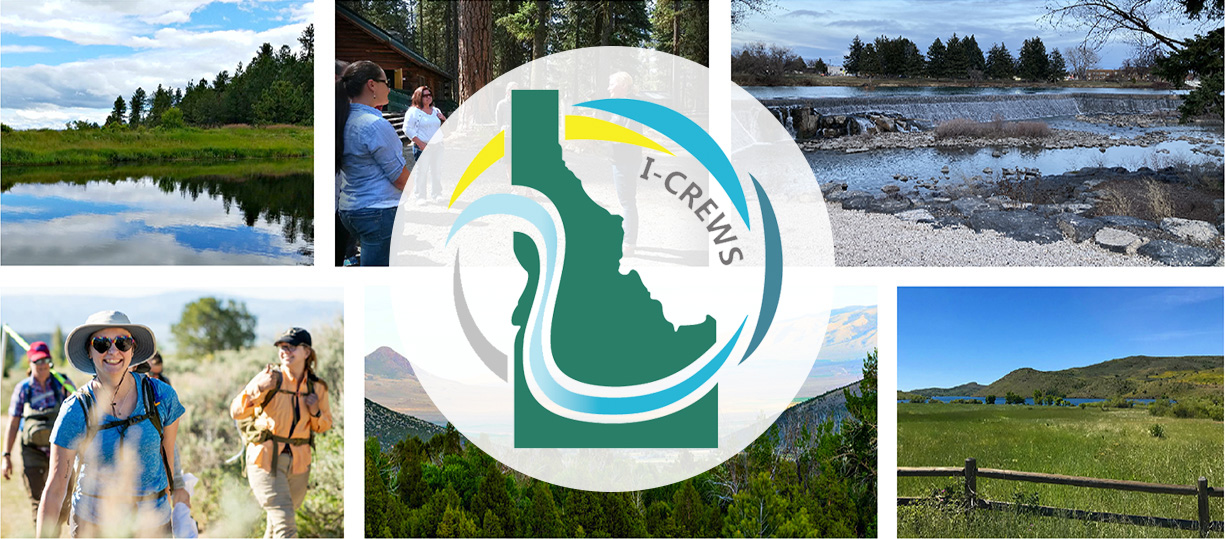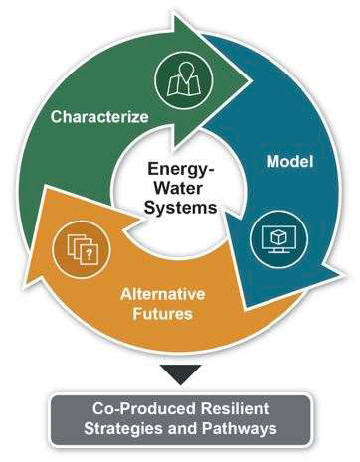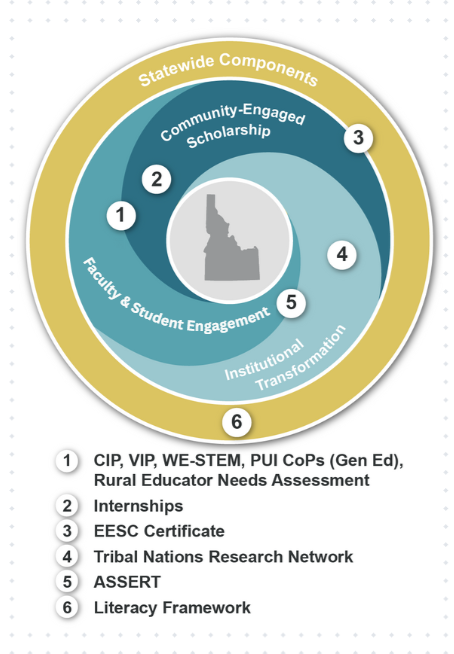
I-CREWS
Idaho Community-engaged Resilience for Energy-Water Systems
Idaho's new $24 million NSF EPSCoR RII project, I-CREWS, aims to address the consequences of meteorological, population, and technological change on energy-water (E-W) systems.
The project will advance research, education, workforce development initiatives, and partnership capacity in Idaho in two strategic directions. First, it will leverage existing academic research strengths in various sciences to build linkages. Second, it will expand Idaho's research capacity in computational modeling, machine learning, and artificial intelligence.
Using a range of Idaho's communities, landscapes, and watersheds, the main objectives of I-CREWS are to:
- evaluate E-W configurations for various resilience strategies,
- model E-W configurations and their resilience,
- develop future scenarios for E-W trajectories and their resilience.


I-CREWS integrates local knowledge, governance dynamics, and advanced modeling. It involves over 35 core university and college faculty, plus 8 new early-career hires, 10 postdocs, and 20 graduate students while supporting 31 Vertically and Community Integrated Projects designed to reach over 500 students and community members. Partnerships outside of academia involve a wide range of entities, from state and federal agencies, public and private utilities, Idaho National Laboratory, to Tribal nations.
I-CREWS will support a robust Seed Funding program guided by external peer merit review. This mechanism will provide the ability to invest in emerging research and community-based education opportunities and/or pursue high-risk, high-impact research.
I-CREWS will increase our empirical and theoretical understanding of how social systems, such as governance dynamics and local knowledge, can inform behaviors, trade-offs, and E-W futures in relation to meteorological, population, and technological change.
The motivating research hypothesis is that communities undergoing changes in their E-W systems can be characterized at different scales to determine patterns of multisystemic resilience to change. Thus, E-W system resilience will be more effectively evaluated, shaped, and implemented by incorporating coproduced local knowledge, and governance dynamics with advanced data analysis and modeling of stressors.
Two cross-cutting research questions will guide the research and the capacity-building:
- What role do trade-offs and changes in E-W systems, including storage, efficiency/conservation, local knowledge, and governance dynamics, play in determining resilience strategies or options to meteorological-driven, population, and technological change?
- How does incorporating multiple ways of knowing, community engagement, and advanced modeling improve the parameterization of pathways associated with more proactively developed and resilient E-W futures?
The project's approaches and outcomes, including an E-W Data Hub and a Futures Foundry, will be nationally transferable.
The project emphasizes community engagement and jointly developed knowledge and will conduct multiple initiatives to increase the participation of all groups in STEM. We will build on models of engaged STEM education while developing researchers' abilities to collaborate more effectively with communities and work with students to build the technical skills necessary to fill E-W systems workforce needs.
I-CREWS will support WFD and student training through high-context, community-engaged courses and projects that are jointly developed with community members to address E-W systems issues. A Tribal Nation Research Network (TNRN) will be developed to recenter knowledge exchange between Tribes and Idaho universities, focusing on collaboration through the development of tribally-originated research.
The project will also support over 120 undergraduate research summer experiences that will provide meaningful research opportunities. Innovative programs for faculty professional development will be expanded to 140 faculty across all three research universities, creating a cohort of researchers supported and enabled to pursue transformative and community-engaged scholarship.
I-CREWS will help determine how urban, rural, and Tribal communities can adapt to meteorological, population, and technological change and will translate this knowledge to help achieve more resilient communities.
I-CREWS responds directly to NSF grand challenges of meteorological and resilience research and innovation and understanding the interplay between availability and distribution of energy and water. Likewise, it addresses NSF’s Sustainable and Clean Energy theme and is aligned with NSF's 10 Big Ideas of Harnessing the Data Revolution and Growing Convergence Research. I-CREWS is well-aligned with the State's new Science and Technology (S&T) plan, directly supporting research and economic development in energy systems, natural resource use and conservation, and systems engineering. This alignment coupled with the promise of I-CREWS increasing collaboration among the State's universities and colleges served as a backdrop to the theme's selection by the Idaho EPSCoR State Committee.
University of Idaho, Moscow, Idaho
Boise State University, Boise, Idaho
Idaho State University, Pocatello, Idaho
Coeur d'Alene Tribe, Coeur d'Alene, Idaho
Shoshone-Bannock Tribes, Fort Hall, Idaho
College of Southern Idaho, Twin Falls, Idaho
Lewis-Clark State College, Lewiston, Idaho
College of Western Idaho, Nampa, Idaho
Center for Advanced Energy Studies (CAES), Idaho Falls, Idaho
Idaho STEM Action Center, Boise, Idaho
Idaho Power, Boise, Idaho
Idaho Consumer Owned Utilities Association, Boise, Idaho
Idaho Department of Water Resources, Boise, Idaho
Idaho National Laboratory, Idaho Falls, Idaho
Avista Utilities, Spokane, Washington
Nez Perce Tribe, Lapwai, Idaho
Shoshone-Paiute Tribe, Owyhee, Idaho
